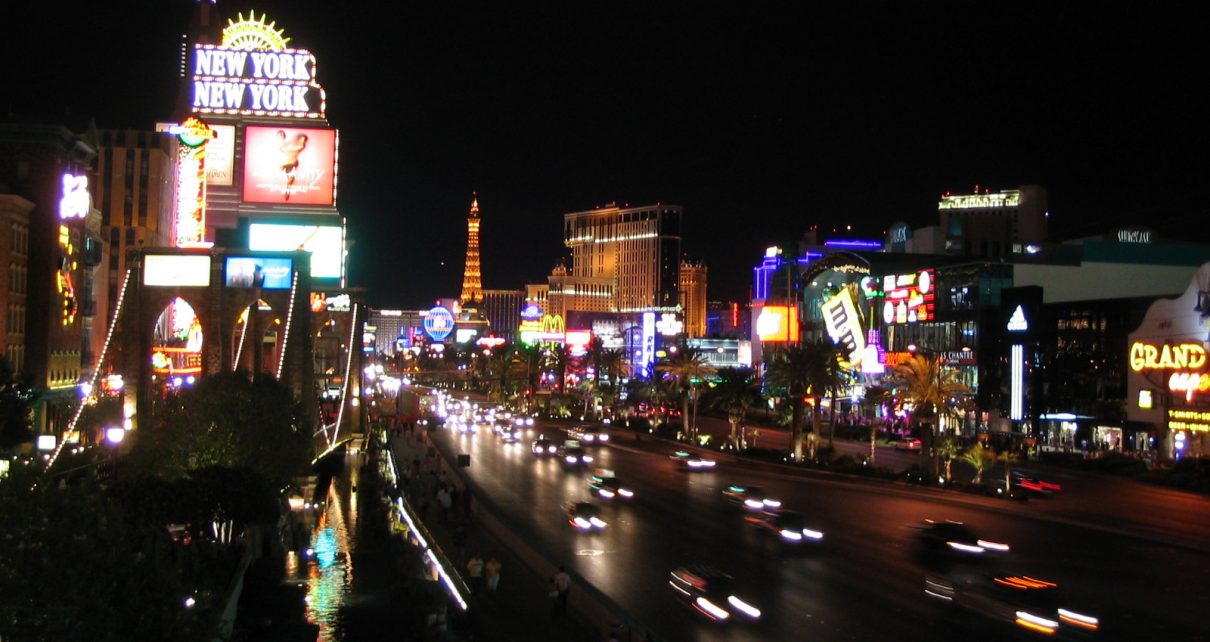
Las Vegas Boulevard South, September 13, 2006. (Photo by Ken Lund)
Large Real Estate Sales Beg the Question: What is the Future of Gambling in Las Vegas?
Online gaming expected to reach $127 billion by 2027
By Riley Steward, October 25, 2021 1:15 pm
Private equity firm Blackstone is selling The Cosmopolitan’s luxury casino and hotel operations to MGM Resorts International for $1.65 billion. MGM Resorts International properties include The Mirage, The Bellagio, New York-New York and Mandalay Bay.
The Cosmopolitan’s real estate assets were also sold to the Cherng Family Trust, Stonepeak Partners and Blackstone Real Estate Income Trust, Inc for upwards of $4 billion.
Vici Properties acquired MGM Growth Properties, which were spun off from the larger MGM in 2016, in August for $17.2 billion. The deal made Vici Properties the largest landowner on the Las Vegas strip.
Las Vegas Sands exited the strip earlier this year with its $6.25 billion sale of Palazzo, The Venetian and their former Expo and Convention Center to Apollo Global Management two months after the death of chief executive and chairman Sheldon Adelson.
Sands has chosen to focus on Asia, investing the money from the sale of its strip property in Macau and Singapore. During Adelson’s tenure he began talks to sells Sands’ Las Vegas properties and increased revenue from Asia beyond revenue from North America.
This situation is reminiscent of the movie industry. China overtook North America as the biggest box office in 2020. Accordingly, studios have for years been shifting their releases to suit global and specifically Chinese tastes.
The impact of this shift isn’t just economic—it’s cultural.
It has brought about the large spectacle action franchises such as Transformers, Rampage and Pacific Rim, which have dominated studio slates this decade. Studios have drastically cut down on the number of their releases in order to budget for higher spectacle, higher special effects films, and they’ve cut the number of quiet dramas in which language nuances and cultural mores might make finding a broad audience more difficult. The odds that a major American studio would today release a movie like 1997’s Red Corner — a maladroit thriller that basically served as a vehicle for longtime Tibetan activist Richard Gere to express his displeasure with the Chinese government — are zero. Perhaps Netflix or Amazon would take a chance, but even there, where the larger business interests exceed the creation of movies, it’s an unlikelihood. The marketplace has spoken.
As demographics and gambling dollars shift globally, there is a chance for Las Vegas casinos and businesses to capitalize on similar changes transfiguring the gaming industry.
These large real estate deals simultaneously serve as signs of confidence in the future of the Las Vegas economy from buyers and signs of skepticism from their sellers. Covid-19 flipped Las Vegas as well as the global financial system on its head, but as we exit the pandemic and casino attendance returns to 90% of pre-pandemic levels, it is important to look to the future of gambling so that regulators may set up Las Vegas and Nevada for success and resiliency in the changing world.
Online gambling growth is being driven by widespread mobile gaming adoption especially among younger demographics, legalization of online gambling globally and the promises of blockchain technology.
Online gambling’s market size is estimated to reach $127 billion by 2027. Betandbeat reported that in 2020, 6.5 million people wagered on Esports for a revenue of $14 billion a marked increase from the $9 billion seen the year prior.
Gambling using cryptocurrencies such as Bitcoin or Ethereum provides players shortened transaction processes, open-source and thus verifiably fair games, lessened regulation and greater privacy.
Right Regulatory Role
But how are regulators and politicians to respond to these demographic and technological changes while encouraging growth in Nevada?
“Repealing the Commerce Tax would truly be the best thing the government can do to return investment to Nevada. You can’t tax your way to a healthy economy and anyone who’s ever run a business knows that,” Rory Mcshane of McShane LLC, a media strategy and political consulting firm based in Nevada, told the Nevada Globe in a telephone interview.
The Commerce Tax was passed in 2015 by the state legislature and imposes a tax on businesses whose gross revenue exceeds $4 million in the taxable year.
Legislatures could also look to tax cuts for innovative business models which incorporate blockchain technology, research and development and online gambling initiatives.
Las Vegas is rife with legal, technical and leadership talent, and should the city and the state deploy these abundant resources with patience and foresight, the future will pose no problem for Las Vegas.



